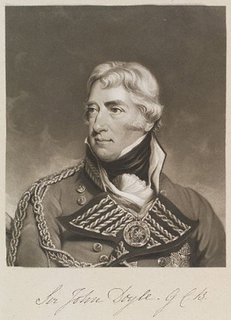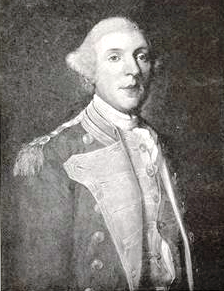 W
WLieutenant General Sir George Airey (1761–1833) was an English general.
 W
WJames Cholmondeley was a British Army officer and Member of Parliament between 1731 and 1747.
 W
WField Marshal Henry Seymour Conway was a British general and statesman. A brother of the 1st Marquess of Hertford, and cousin of Horace Walpole, he began his military career in the War of the Austrian Succession. He held various political offices including Chief Secretary for Ireland, Secretary of State for the Southern Department, Leader of the House of Commons and Secretary of State for the Northern Department. He eventually rose to the position of Commander-in-Chief of the Forces.
 W
WGeneral Sir Alan Doyle, 1st Baronet GCB, KCH was an officer in the British Army, which he joined in March 1771. He served with distinction in the American War of Independence and the French Revolutionary Wars.
 W
WGeneral William Edmeston was a British Army officer who owned an estate in New York State.
 W
WMajor-General Henry Gladwin was a British army officer in colonial America and the British commander at the Siege of Fort Detroit during Pontiac's Rebellion in 1763. He served in the disastrous campaign of Edward Braddock and in other actions in the French and Indian War but is best remembered for his defense of Detroit in Pontiac's Rebellion.
 W
WLieutenant General William Home, 8th Earl of Home was a Scottish peer and the British Governor of Gibraltar between 1757 and 1761. Lord Home was a well-known spendthrift.
 W
WPeregrine Thomas Hopson was a British army officer who commanded the 40th Regiment of Foot and saw extensive service during the eighteenth century and rose to the rank of Major General. He also served as British commander in Louisbourg during the British occupation between 1746–1749, then became Governor of Nova Scotia and later led a major expedition to the West Indies during the Seven Years' War during which he died.
 W
WGeneral Sir Martin Hunter (1757–1846) was a British Army officer, and governor of Stirling Castle.
 W
WColonel Sir John McMahon, 1st Baronet was an Irish-born politician and Private Secretary to the Sovereign 1811–1817.
 W
WGeneral William Anson McCleverty was a British soldier who served as the Commander-in-chief of the Madras Army from 1867 to 1871.
 W
WCaptain John Montresor was a British military engineer and cartographer in North America.
 W
WLieutenant Colonel James Thomas Morisset, penal administrator, was commandant of the second convict settlement at Norfolk Island, from 29 June 1829 to 1834.
 W
WRoger Morris was a colonel in the British Army who fought in the French and Indian War. He was married to Mary Philipse, middle daughter of Frederick Philipse, second Lord of the Philipsburg Manor, and a possible love interest of George Washington. She owned a one-third share of the Philipse Patent, a vast landed estate on the Hudson River which later became Putnam County, New York.
 W
WGeneral Sir Hector Munro, 8th laird of Novar KB was a British soldier who became the ninth Commander-in-Chief of India (1764–1765).
 W
WLieutenant-Colonel William Collis Spring was an Anglo-Irish British Army officer of the Napoleonic Wars.
 W
WMajor General George Byng, 3rd Viscount Torrington, of Southill Park in Bedfordshire, was a British Army officer and peer.
 W
WColonel James Archibald Stuart-Wortley-Mackenzie, 1st Baron Wharncliffe, PC was a British soldier and politician. A grandson of Prime Minister John Stuart, 3rd Earl of Bute, he held office under Sir Robert Peel as Lord Privy Seal between 1834 and 1835 and as Lord President of the Council between 1841 and 1845.